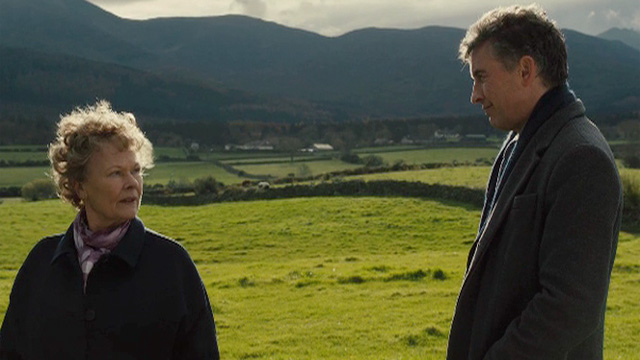Basing the film on what is a remarkable true story, the writers of Philomena (who include one of the films stars, Steve Coogan) had a certain obligation. The real Philomena Lee is of a strong Catholic faith, and it would seem of a very forgiving nature. The very nature of the events in this film meant it could have been so easy for the writers to depict the Catholic Church as nothing more than a monstrous organisation. But like the woman whose story is being told, Philomena is not a hateful film. It is a film about family, forgiveness, accepting that faith is an important part of some people’s lives. Such as it is, Philomena is quite the heart-warmer.
Martin Sixsmith (Steve Coogan), former political journalist, has just lost his job as a political adviser for the British government. Despondent and cynical, he by chance meets the daughter of Philomena Lee (Judi Dench), who upon hearing that he is thinking of returning to journalism, suggests her mother might have a story for him. In 1950s Ireland, young Philomena (played by Sophie Kennedy Clark) became pregnant out of wedlock, and her family sent her to a convent out of shame. After she gave birth to her son Anthony, she worked in the convent for two years, only seeing Anthony for a little while each day, until the nuns there had Anthony adopted without giving her any warning. Fifty years later, and Philomena is still looking for Anthony, and now with Martin, she has a chance to finally find out what happened to him.
Judi Dench could play any role in the world and I would think she was the perfect choice. Personal bias aside, as the title character Dench is charming, loveable, exuding this feeling of being an absolutely wonderful person. There is no other way of putting it. You’d be proud to have a woman like that in your life. Perfectly matched as Philomena’s counterpoint is Coogan as Sixsmith. He is the typically cynical non-believer, who unsurprisingly learns about the importance of forgiveness, or at least, the healing effect that forgiveness can have. It’s really delightful to watch their relationship develop on screen. Both actors have impeccable comic timing, and together have some very funny moments, as well as some rather poignant ones. Even though I’m sad to say that Philomena failed to elevate to any great heights of emotion, it was overall quite touching.
As I’ve previously mentioned, the filmmakers chose the path of not trying to pronounce judgment on the Church, or the nuns, or anyone really involved in the adoption of Anthony (and the many other children like him). We are instead present with the two differing viewpoints of Philomena and Martin, and it is left to us to decide how we should feel about it. Martin is absolutely furious at the treatment Philomena has received; on the other side of the coin, Philomena she is ready to forgive, simply asking what the purpose of holding on to hate would be? It stops Martin in his tracks, and forces him, and us, to reconsider.
Ultimately, we come to realise that this is a story that must be told, and that actions must be accounted for, but that holding onto toxic feelings may do more harm than good. Religious or not, that should be a message that resonates with all. Philomena is a lovely, moving film, with performances from Dench and Coogan that will brighten anyone’s day.
